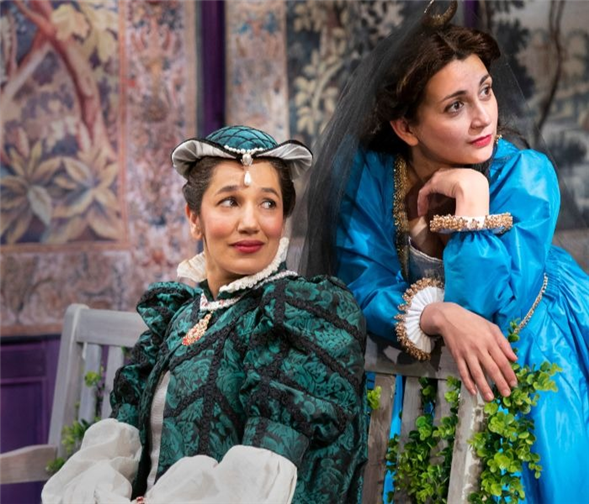Let’s Hear It for the ‘Wives’
Home > TDF Stages > Let’s Hear It for the ‘Wives’

Jaclyn Backhaus’ new time-hopping play puts the women behind great men center stage
—
Playwright Jaclyn Backhaus doesn’t do straightforward linear narratives, which she describes as “patriarchal plot structure.” She’s made that clear with her surreal, gleefully anachronistic shows such as Men on Boats, an inventive dramatization of the Powell Geographic Expedition of 1869 with a diverse cast of women portraying the male explorers, and Folk Wandering, a musical interrogating the tenuousness of the American Dream over the course of the 20th century. In her latest play Wives, currently running at Playwrights Horizons, she takes her greatest time-hopping journey yet, with a story that bounces from King Henri II’s palace in 16th-century France, to Ernest Hemingway’s funeral in 1960s Idaho, to Maharaja Madho Singh II’s harem in 1920s India. All three sections explore the real-life women in their lives: how they relate to the men they’re involved with, how they claim power once those men are gone and what they leave to the women who come after.
But Wives is definitely not a docudrama. Like most of Backhaus’ work, the play, which is directed by Margot Bordelon, ignores the constraints of chronology and history. The evolution of the women’s relationships across time and space is what fuels the action. “In the first scene, the women are foes,” Backhaus explains. “In the second, they become friends, and in the third, they become family.”
Backhaus also eschews period speech in favor of contemporary dialogue. In addition to the inherent humor in hearing King Henri II’s mistress call Queen Catherine de’ Medici a “fake-ass bitch,” the playwright’s use of modern-day language helps her get into the heads of her characters. As she puts it: “A lot of the source texts I used are so heavily reliant on the men’s stories and the male perspective that it’s like, how can I immediately try to start subverting that?”
The familiar vernacular allows audiences to connect with these figures who were largely lost to history, which has long been written by men. “For women, the only things that survived were regal portraits or notes about their weddings,” Backhaus notes. “Not the moment when they were crying and super drunk and mad at someone. You don’t get to see the messiness and the realness of life.”
While Backhaus was able to find biographical information on de’ Medici and Hemingway’s wives, Roop Rai — the favorite courtesan of Maharaja Singh II of Jaipur, India — is barely a footnote. The Punjabi-American dramatist learned about Roop Rai in a book she picked up at The Strand while doing research for another play. “Singh II was under the influence of this witchy concubine, who was supposedly poisoning him and stealing all of his money,” she says. “I was like, oh, she sounds like a badass!” So Backhaus decided to resurrect her.
Wives actually started out as three separate plays. But as Backhaus was writing, she noticed thematic parallels among the women’s stories, so she tried combining them. She just wasn’t sure how to end it. “I had to stall on finishing the play until I figured out what about it was connecting it to itself,” she says.
After almost two years of rumination, a spark of inspiration from Virginia Woolf’s A Room of One’s Own gave Backhaus the kick she needed to tie it all together. That meta-literary look at how women’s stories were being told gave Backhaus permission to take a similar approach to Wives. “I realized there was a way for me to look at this exploration from the outside and see how it’s helping me affirm myself as a writer,” she says.
Explaining exactly how Backhaus brings these disparate tales together would be a spoiler. Suffice to say she wants to make sure all women — including her — get a chance to write their own histories.
—
Jen Gushue is a freelance theatre writer with bylines in American Theatre, HowlRound and Business Insider. Follow her on Twitter at @jengushue. Follow TDF at @TDFNYC.
Top image: Purva Bedi and Aadya Bedi in Wives. Photos by Joan Marcus.
TDF MEMBERS: Go here to browse our latest discounts for dance, theatre and concerts.

